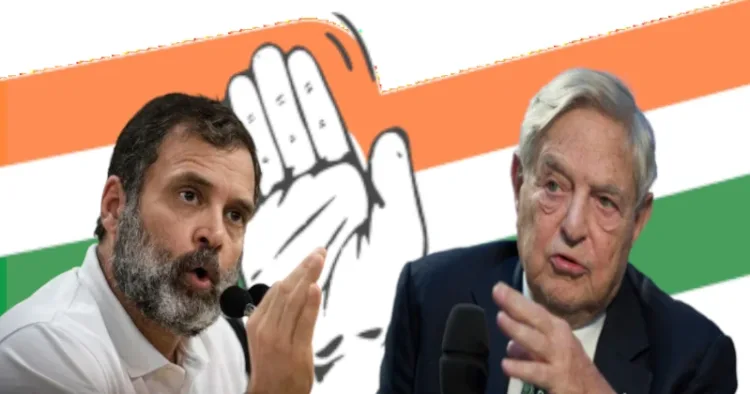A deepening connection between the Congress party and global financier George Soros has emerged, highlighting the extent of foreign influence on Bharat’s internal politics. This alliance, involving prominent Congress leaders, is sparking concerns over its potential to undermine India’s economic stability, political autonomy, and national security.
At the center of this controversy is Sonia Gandhi, Co-President of the FDL-AP Foundation, an organisation with financial backing from George Soros’ Open Society Foundations. The FDL-AP Foundation, which has been a vocal supporter of democratic principles, has also controversially advocated for the separation of Kashmir from Bharat, raising alarms over the organisation’s political leanings. The foundation’s stance on Kashmir as an independent entity aligns with separatist agendas, a position that directly contradicts Bharat’s longstanding territorial integrity. This connection between Sonia Gandhi and a Soros-funded organisation that promotes such views raises serious concerns about the foreign influence on Indian politics.
Furthermore, Sonia Gandhi’s leadership of the Rajiv Gandhi Foundation has only served to strengthen the ties between Congress and Soros. Under her chairmanship, the foundation partnered with Soros’ Open Society Foundations, which has consistently funded organisations pushing for political change across the globe. This partnership, according to critics, suggests that foreign money may be shaping the political direction of one of Bharat’s major political parties, raising questions about the influence of such external forces on India’s governance and national policies.
Salil Shetty, the Vice President of Soros’ Open Society Foundations, was seen participating in the Bharat Jodo Yatra alongside Rahul Gandhi, former President of the Congress party. This high-profile appearance has raised eyebrows, as it underscores the growing collaboration between Soros-backed entities and the Congress leadership. Shetty, an advocate of global democracy and human rights, may be seen as a figure aligning with a broader ideological agenda, which some argue could be at odds with India’s national interests.
The most troubling aspect of this alliance has been the role of George Soros himself in shaping the discourse surrounding Bharat’s economic and political landscape. Soros, a billionaire investor known for his philanthropic activities and political interventions worldwide, has been an outspoken critic of Prime Minister Narendra Modi’s administration. His organisation, the Open Society Foundations, has funded a variety of causes that seek to influence political outcomes in several countries, and Bharat appears to be no exception.
Rahul Gandhi’s outspoken criticism of billionaire industrialist Gautam Adani has served as a focal point for this foreign-backed influence. In a dramatic press conference, Rahul Gandhi used reports from the Soros-backed OCCRP (Organised Crime and Corruption Reporting Project) as the basis for his allegations against Adani, accusing him of close ties to Prime Minister Modi. This media strategy, which seemed orchestrated with the help of Soros-funded organizations, suggested a coordinated effort to target Modi’s administration and create political instability. Gandhi’s rhetoric, echoing Soros’ sentiments about the potential for the Adani issue to topple the government, reflects a disturbing alliance between the Congress leadership and powerful foreign interests.
To further complicate matters, Congress MP Shashi Tharoor has publicly acknowledged Soros as an “old friend,” solidifying the deepening relationship between Soros and the Congress party. Tharoor, an influential member of the party, has a history of expressing admiration for Soros’ work, particularly in the realm of global democracy and human rights advocacy.



















Comments